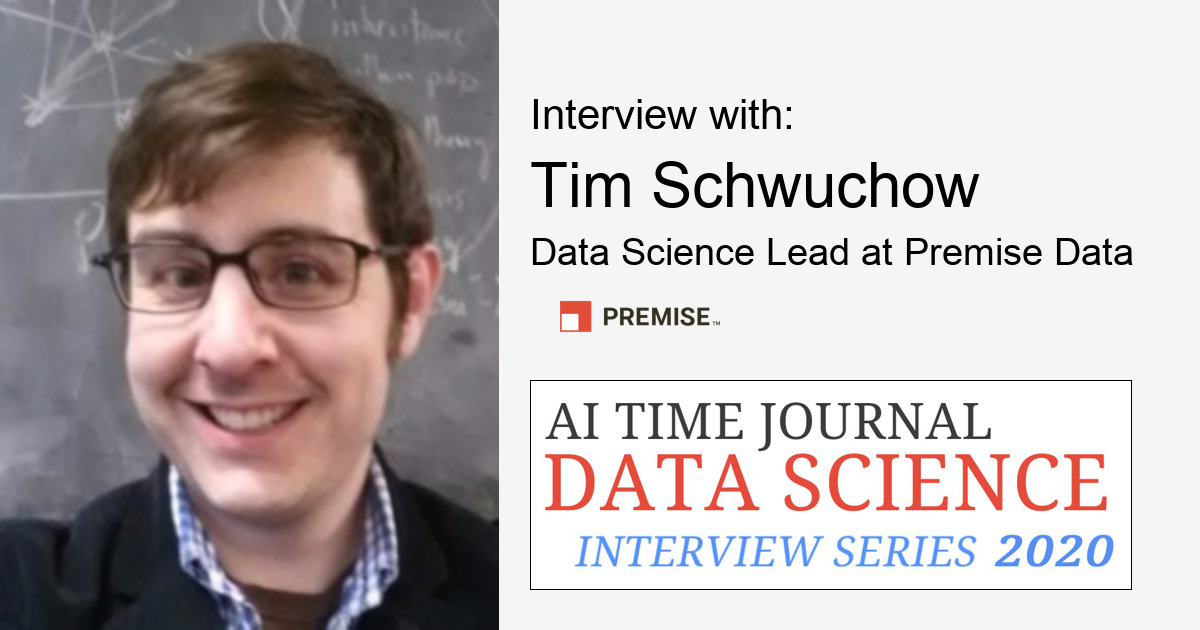
We thank Tim Schwuchow from Premise Data for taking part in the part of the Data Science Interview Series 2020.
How did you first get into data science?
I’m a reformed academic. I spent too much in grad school and did coding projects on my own and loved doing my own statistical analysis. I fell in love with it and then got involved with Premise.
We’ve been doing crazy, exciting things and I’m lucky to have a lot of autonomy. I have a lot of trust and power and am allowed to find ways to make the data useful. I’ve been really blessed to have opps here to make our data valuable for our customers. It’s like we have eyes everywhere in the world and are able to assemble what we see into meaning. The challenge is to render the information in a way that is useful for decision makers. I feel like there is so much we can say and do here….we have the right data and culture.
How is data science used to create value in your current project(s)?
One of the projects we’re working on at the moment is a project called Iris. It’s a UI and backend system for taking the data we collect about places and aggregating it into a foundational layer about points of interest around the world.
For example, we take individual submissions from tasks completed by our crowdsourcing network (of two million contributors from around the world) which might be something like, “Go to any bank, take a pic of the sign and tell us what it’s like to be there. What are the hours? What services are available?” We ask different questions in different places. The individual views are interesting but we want to build a consensus. We want to group the data and say, “This group of data pertain to this place and this set pertains to a different place.”
What are the key skills that you use every day as a data scientist, and how did you develop them?
On a daily basis, I spend most of my time doing programming of some kind, working through issues with colleagues, or taking meetings to understand stakeholder requirements. Language-wise, most of what we do is Python for core functionality and Javascript for UI or APIs. My journey as a programmer is a bit non-traditional insofar as I’ve never taken a computer programming course in my life. As an Economics graduate student I was doing some pretty heavy computational modeling and started using Python for that type of statistical modeling and kind of went from there to building little applets for fun, to scrape data, to clean up data, among other applications.
Apart from programming, having some domain knowledge of statistics and economics has been extremely helpful in my current role. Another project I’ve been working on at Premise is the processing of the data that we collect about the prices of various goods into consumer prices indices; knowledge of time series econometrics is obviously very important for that! More broadly, familiarity with formal statistics and economics is critical for making sure that we’re collecting and interpreting our data using sound methodologies.
What are the top challenges you currently face as a professional data scientist, and how do you go about tackling them?
One thing I find challenging is trying to strike the right balance and having general vs. deep knowledge. Am I the best person at writing a neural network for a training model? Am I the best person to create a pipeline? The answer to each of these questions individually is “no.” But if you take the ensemble of all the things I can do functionally well, the calculus shifts.
While our data science team is small compared to most organizations, it is elite and we’ve been able to accomplish amazing things through the broadness of our skill sets and our focus on results. I spend a lot of time learning new things and keeping abreast of evolving technologies to be as productive as I can be and make sure that the things that we build are as robust and scalable as possible. It’s a challenge to stay on top of things but also one of the things I love most about the job.
How important is the domain knowledge of the business/industry you’re in as a data scientist, and how did you acquire it?
Prior to coming to Premise I taught at a data science bootcamp and definitely recommend that for people coming out of academia who want to break into this field – I definitely see value in following that route, but it is a commitment. Free services like Coursera are an alternative if you don’t have the time for something quite so immersive.
Do you create data science content?
These days I’m blogging for Premise.
Conferences: which data-science-related conferences that you attended have you particularly enjoyed and why?
This year I was planning on going to conferences for ESRI and Tensorflow, it’s looking like those will be virtual this year with COVID but I’d like to attend both. In the past, I’ve enjoyed attending various O’Reilly AI conferences, those are a great way to keep current.
